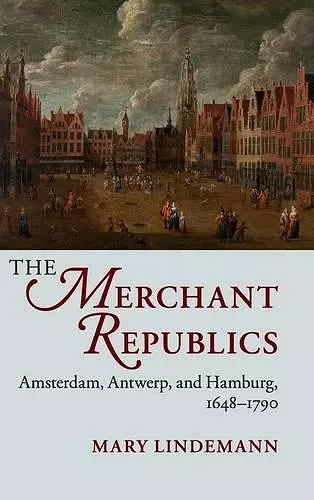The Merchant Republics
Amsterdam, Antwerp, and Hamburg, 1648–1790
Format:Hardback
Publisher:Cambridge University Press
Published:11th Dec '14
Currently unavailable, and unfortunately no date known when it will be back
This hardback is available in another edition too:
- Paperback£36.99(9781107426290)

This book analyzes the ways in which Amsterdam, Antwerp and Hamburg developed dual identities as 'communities of commerce' and republics.
The Merchant Republics analyzes the ways in which three major economic powerhouses - Amsterdam, Antwerp and Hamburg - developed dual identities as 'communities of commerce' and republics over the course of the long eighteenth century (c.1648–1790).The Merchant Republics analyzes the ways in which three major economic powerhouses - Amsterdam, Antwerp and Hamburg - developed dual identities as 'communities of commerce' and as republics over the course of the long eighteenth century (c.1648–1790). In addition to discussing the qualities that made these three cities alike, this volume also considers the very real differences that derived from their dissimilar histories, political structures, economic fates and cultural expectations. While all valued both their republicanism and their merchant identities, each presented a different face to the world and each made the transition from an early modern republic to a modern city in a different manner.
'The Merchant Republics expands outward from the most prominent North German commercial center, Hamburg, and presents it alongside Antwerp in the Southern Netherlands and Amsterdam in the Dutch Republic as part of an innovative and comparative study of three leading European commercial centers. Comparative history of this kind is a very difficult genre to produce, but Mary Lindemann has succeeded to a remarkable extent. This book is far more than three parallel studies within one book. By acknowledging the real contrasts between Amsterdam, Antwerp, and Hamburg, Lindemann is able to make some effective and revealing comparisons, located in the context of each city's earlier evolution, and to highlight the real similarities. Lindemann is one of the most distinctive voices currently writing about the 'long eighteenth century', and her latest book will add to her already high reputation.' Hamish Scott, University of Glasgow
'The Merchant Republics places Antwerp, Amsterdam, and Hamburg in the wider context of the great northwest European port cities. Mary Lindemann's focus on the theme of the merchant republic delivers a highly original examination of ideas about republicanism and commerce, a comparative analysis of the political management of the three cities, a study of the self-image of the mercantile classes in each case, and an account of the way in which those groups actually did business in practice. In each respect Lindemann's book breaks new ground for there has never been a work that has explored these topics. The Merchant Republics is a tour de force, a hugely impressive piece of original scholarship that will be of lasting significance.' Joachim Whaley, University of Cambridge
'Mary Lindemann's new book gives a lot to think about. The Merchant Republics is not an ordinary comparative history of three leading commercial cities in early modern Europe. To be sure, it offers a lavish, up-to-date overview of the historiography on the economic, political, and social structures and fortunes of Antwerp, Amsterdam, and Hamburg, and it clearly and subtly explains their differences and similarities. It does all of this, but at the same time, it strives to do much more. Lindemann's underlying aim is to show that the notion 'merchant republic' can serve as a useful concept to understand political cultures in early modern Europe.' Karel Davids, Reviews and Critical Commentary (councilforeuropeanstudies.org/critcom)
'This book takes us right to the heart of three early modern cities. Mary Lindemann successfully evokes the lives of merchants and bankers in Amsterdam, Antwerp, and Hamburg with her multifarious and multifaceted stories, revealing fascinating facts and details of urban life and strife.' The American Historical Review
'Although not an economic history in the strictest sense, the book challenges a classic economic interpretation of the rise and fall of European commercial centers through its strong focus on perception and identity. Lindemann has written a history of the positioning of commerce in urban self-fashioning and political functioning. It is based on a rich consultation of secondary literature, showing Lindemann's excellent command of the historiography about the Netherlands, Belgium, and Germany …' Tijl Vanneste, Journal of Interdisciplinary History
ISBN: 9781107074439
Dimensions: 231mm x 152mm x 30mm
Weight: 670g
374 pages